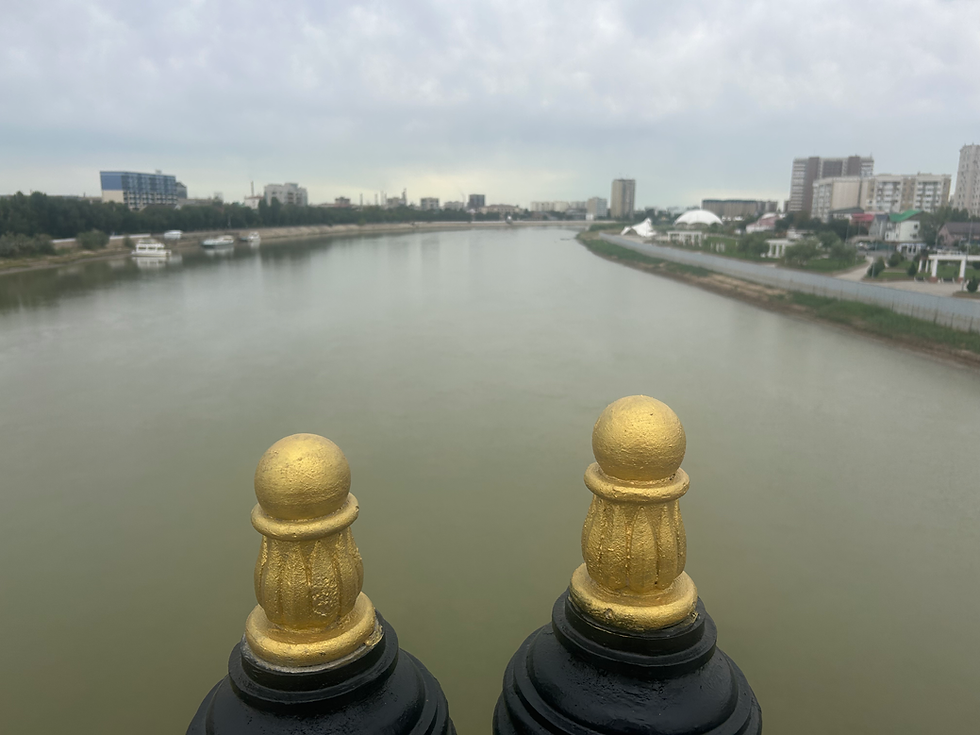Equatorial Guinea
- Wolfgang Fobo
- 9. Apr. 2019
- 4 Min. Lesezeit
One of the least visited countries, and not exactly provided with an infrastructure for tourists, you must have a foible for the bizarre, which I indeed have. And for nature. Countries with a practically closed door are like a provocation for me, to try and see what is behind. However, I would not advise to travel as an individual tourist, as this is too cumbersome to get along. I joined the group tours offered by Undiscovered Destinations, and we were a bunch of like minded travelers, who shared our stories when traveling far off the beaten track.
Equatorial Guinea is a country that is both rich and poor. It shows its wealth in their roads, they are really in a very good state, even in the countryside. President Obiang also builds monuments and government structures to demonstrate his power, which is built on oil. Theoretically Equatorial Guinea could be the richest country in Africa, on an income per capita base. Which however you do not see evenly spread.

Bioko Island is covered with pristine jungle, and their Ceiba tree, which is considered sacred by the people over there, dominates the jungle.

The most striking display of natural wealth I could not photograph, as it was in the middle of the night, and photographing was strictly discouraged: we could watch giant sea turtles coming to shore, crawling up the beach, with every move they made they moaned with an "ahhh", and you could see how much effort it cost them to come to shore. Perhaps 100m on land, they started to dig holes with their back legs, and once the hole was deep enough eggs tumbled into the hole, in dozens. We were standing around these giant turtles and were absolutely moved, while the turtles did not make any notice of us.

Another scene we impossible could take photos were the countless road blocks. Every couple of kilometers we were forced to stop, then our guide had to get out and hand over our documents to the police. No friendly faces they had, and all the time our documents were studied in detail. In order to travel in Equatorial Guinea you need not only a valid visa - this allows you only to reach your hotel in Malabo. And perhaps including Malabo, the capital of Equatorial Guinea. But in order to travel you need a travel permit, which lists all the places that you are allowed to visit. Prearranged by Angel, our guide. Without Angel and his 2 native guides we would probably not have ventured far, as they always dealt with the police at these many road blocks. In one case we were almost sent back, caused by a typo in the travel permit of one of us, so travel permit and passport did not exactly coincide. With some luck - the uncle of one of our native guides was a Colonel who happened to pass by, the situation could be solved in our favor, and we could carry on with our journey. Certainly there would have been also an alternative solution, some money thrown at the police, and we would have made it anyway. For Angel however this was a no-go, against his principles. We were told that the many Chinese who do their business in this country always pay to overcome the trouble at the road blocks, as they seem to be used to such kind of dealings.
Equatorial Guinea is the only Spanish speaking country in Africa, and so it was the Spaniards who left their traces here.

Sometimes I wonder whether life was really that bad under their colonial masters. I cannot imagine that this rule that the people have to accept gives a better future. We visited ruins of a wood processing plant in the country side, established by the Spanish. An old man who had nothing to do explained to us the glorious past when everything and everybody was working, and now, everything is at a stand still, with no hope of a better future.



There are these contrasts, obscene contrasts I would say.

The most absurd contrast was displayed in the jungle of the mainland. The government wants to build a brand new capital, named Oyala. Construction is far behind schedule, and we all bet that this capital will never be operational. You drive for hours through pristine jungle on a four lane highway, and then out of the jungle a large clearance is made, on which a few structures stand.

The most striking example of a contrast was the 5 star hotel where we could spend a night. Truly, this was luxurious in every respect.



Later that day, we were shown the entrance to their national park. For a while it was operated by Spaniards, with a guest house complex for tourists. We were told that envy of local strongmen who thought that they could make that money as well as the Spaniards, kicked the Spaniards out, and after one year the total complex was dysfunctional. Nobody there any more.

This is Equatorial Guinea. You see wealth and poverty close together. Which makes me humble one more time. To be just a visitor, making me grateful that my own life cannot be so bad after all.



Kommentare